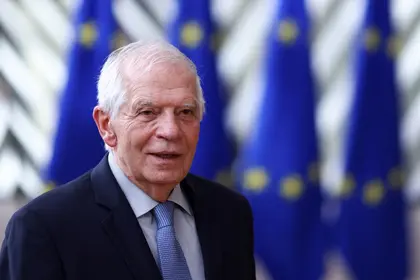The European Council, according to its official press release, has adopted its thirteenth package of restrictive measures against Russia, marking the second anniversary of the start of Russia’s full-scale invasion of Ukraine.
These measures target individuals and entities supporting Putin's regime and perpetuating the "illegal, unprovoked, and unjustified war of aggression."
JOIN US ON TELEGRAM
Follow our coverage of the war on the @Kyivpost_official.
Josep Borrell, High Representative for Foreign Affairs and Security Policy, emphasized the EU's ongoing commitment to pressuring Russia.
"As we mark two years since Vladimir Putin launched the full-scale invasion of Ukraine, the European Union continues to apply pressure on Russia," stated Borrell.
The Council's latest actions include tightening restrictions on Russia’s military and defense sector, with a focus on entities in third countries supplying equipment. Additionally, measures target those responsible for the illegal deportation and military re-education of Ukrainian children.
"We remain united in our determination to dent Russia’s war machine and support Ukraine in its legitimate fight for self-defense, restoring independence, territorial integrity, and sovereignty," Borrell stressed.
What the measures today’s package includes
The latest package includes sanctions on 106 individuals and 88 entities deemed responsible for actions threatening Ukraine's territorial integrity, sovereignty, and independence.

EXPLAINED: What We Know About Russia’s Oreshnik Missile Fired on Ukraine
The focus of the new listings is on the military and defense sectors, targeting individuals involved in arms supply from North Korea to Russia, as well as members of the judiciary, local politicians, and those responsible for the illegal deportation and military re-education of Ukrainian children.
With these additions, EU sanctions now cover over 2000 individuals and entities. Those listed face asset freezes, and EU citizens and companies are prohibited from providing funds to them. Additionally, individuals face travel bans, barring entry or transit through EU territories.
To tighten import-export controls, the Council has added 27 entities to the list supporting Russia's military and industrial complex. These entities, located in countries such as India, Sri Lanka, China, Serbia, Kazakhstan, Thailand, and Turkey, are involved in circumventing trade restrictions or supplying electronic components for Russia's military.
The decision also expands restrictions on exports of goods contributing to Russia's defense sector, including components for unmanned aerial vehicles (UAVs). Moreover, new measures limit exports of items enhancing Russian industrial capabilities, such as electrical transformers.
The EU has included the United Kingdom in a group of partner countries applying similar import restrictions on iron and steel from Russia. These measures align with the EU's efforts to maintain unified actions against Russia's aggression.
The full legal details of these sanctions will be published soon in the Official Journal of the EU.
You can also highlight the text and press Ctrl + Enter






